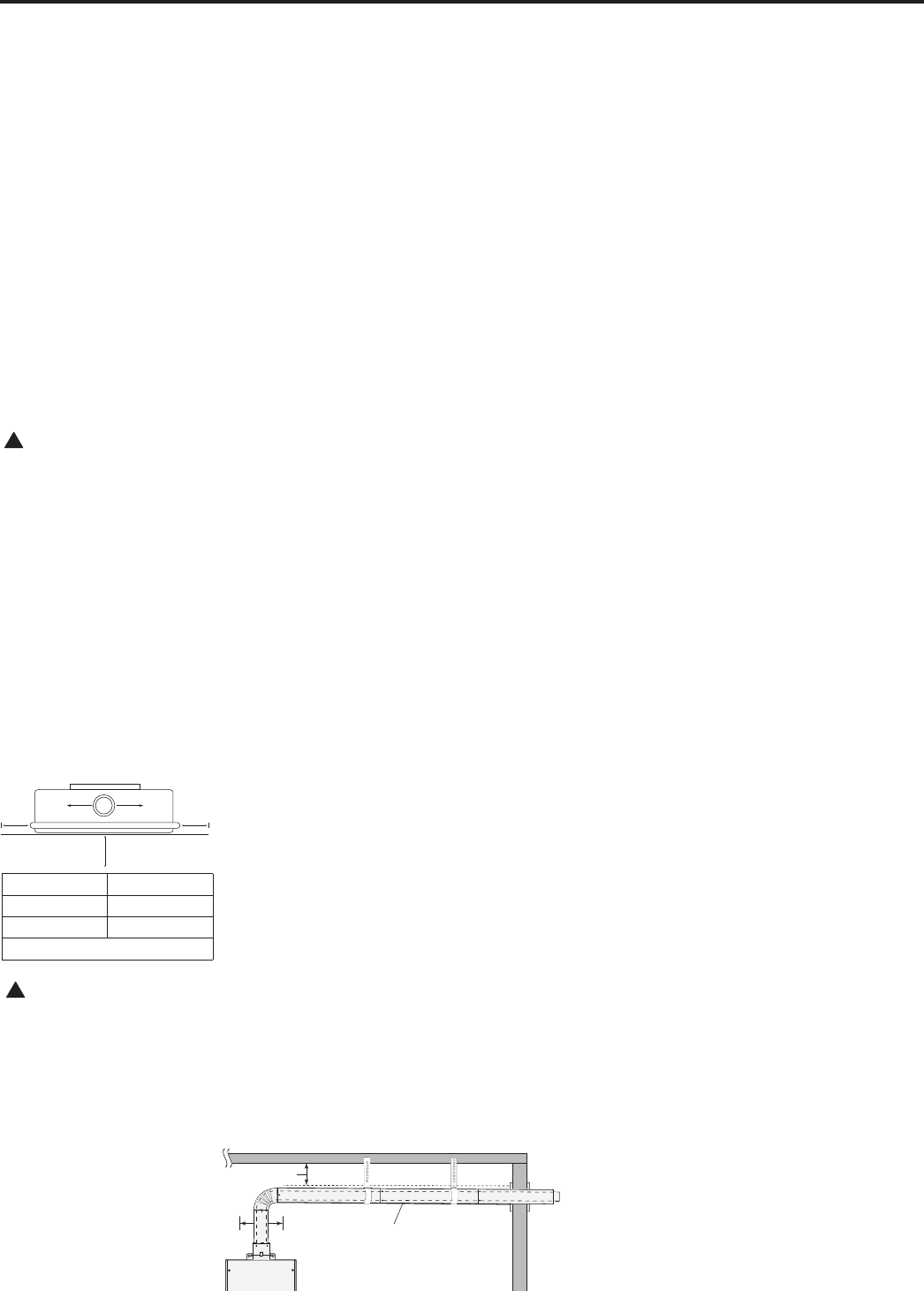
1” (2.5 cm) min
1” (2.5 cm)
min
1” (2.5 cm)
min
Coaxial Vent Pipe
& Air Intake
!
WARNING: Follow vent
manufacturer’s instruction
while installing vent. If
required, provide
additional clearances from
vent to combustibles per
vent manufacturer’s
instruction.
7
Installing the water heater :
This water heater must be installed in accordance with these instructions, local codes, utility company
requirements and/or in the absence of local codes, use the latest edition of the American National Standard/
National Fuel Gas Code. A copy can be purchased from either the American Gas Association, 400 North
Capitol Street Northwest, Washington, DC 20001 as ANSI standard Z223.1 or National Fire Protection
Association, 1 Batterymarch Park, Quincy, MA 02269 as NFPA 54. In Canada, the latest edition of the CSA
B149.1 Natural Gas and Propane Installation, and the Canadian Electrical Code, CSA C22.1 Part 1, in the
absence of local codes.
Location of Water Heater
The water heater should not be located in
an area where leakage of the heat exchanger
or connections will result in damage to the
area adjacent to it or to lower floors of the
structure.
When such areas cannot be avoided, it is
recommended that a suitable catch pan,
adequately drained, must be installed under
the water heater.
The pan must not restrict combustion
air flow.
A gas fired water heater or any other appliance
should not be installed in a space where liquids
which give off flammable vapors are
to be used or stored. Such liquids include
gasoline, LP gas (butane or propane), paint
or adhesives and their thinners, solvents
or removers.
Because of natural air movement in a room or
other enclosed space, flammable vapors can be
carried some distance from where their liquids
are being used or stored. The open flame of
the water heater’s main burner can ignite these
vapors causing an explosion or fire which
may result in severe burns, death or property
damage.
The water heater must be located so it is not
subject to physical damage, for example, by
moving vehicles, area flooding, etc.
If the water heater is installed in a garage, it
should be installed so that the direct ignition
system and main burner are no less than 18
inches (45 cm) above the garage floor.
Raising the gas fired water heater will reduce
BUT NOT eliminate the possibility of lighting
the vapor of any flammable liquids which may
be improperly stored or accidentally spilled.
● The water heater should be installed as
close as practical to the vent termination
to minimize vent length and the number of
elbows required for venting.
● The water heater should be installed with
the proper venting materials and termination
suitable for Category III venting.
● A fire stop plate should be installed at every
penetration of a floor or ceiling if the vent is
not running in a fire rated shaft.
● Failure to install and properly vent the water
heater to the outdoors as outlined
in the Venting Section of this manual
can result in unsafe operation.
● Long hot water lines should be insulated to
conserve water and energy.
● The water heater and water lines should
be protected from exposure to freezing
temperatures.
● Do not install the water heater in
bathrooms, bedrooms, any occupied rooms
normally kept closed, or in outdoor areas.
● Do not install water heater where subject
to vibrations.
● Do not install the water heater in
Recreational Vehicles, Mobile Homes,
Boats and other Watercrafts.
● Do not install the water heater near vents
for heating or cooling. A minimum of 4 feet
(1.2 m) should be maintained.
● Minimum clearance from combustible and
non-combustible construction is 1/2” (1.3
cm) sides, 0” rear (with support bracket);
12” (30 cm) from the bottom; 12” (30 cm)
from the front of the water heater; and 12”
(30 cm) from the top (24” [61 cm] from
front and top is recommended for servicing
purposes).
● Maintain a minimum clearance of
1” (2.5 cm) around the coaxial vent
pipe to combustible or non-combustible
construction, unless otherwise specified
by vent manufacturer or installed in an
enclosed space. If the clearances stated on
the Instruction/Warning Label, located on
the front panel of the heater differ, install
the water heater according
to the clearances stated on the label.
!
WARNING:
Combustible construction
refers to adjacent walls
and ceilings and should not
be confused with
combustible or flammable
products and materials.
Combustible and/or
flammable products and
materials should never be
stored in the vicinity of this
or any gas appliance.
min.
1/2 "
min.
1/2 "
min. 12"
(24" (61 cm) minimum is
recommended for service)
To p = 12" (30 cm)
CoAxial Vent =
1"
Front = 12" (30 cm)
min. 1"
min. 1"
Back = 0" *
Side = 1/2"
Bottom = 12"
* (with support bracket)
(30 cm)
(2.5 cm)
(1.3 cm)
(1.3 cm)
(1.3 cm)
(2.5 cm)(2.5 cm)
(30 cm)
Minimum Clearance from
Combustible and
Non-Combustible
Construction.
Top = 12" (30 cm) Bottom = 12"
Front = 12" (30 cm) Back = 0"*
Side = 1/2" CoAxial Vent = 1"
* (with support bracket)


















